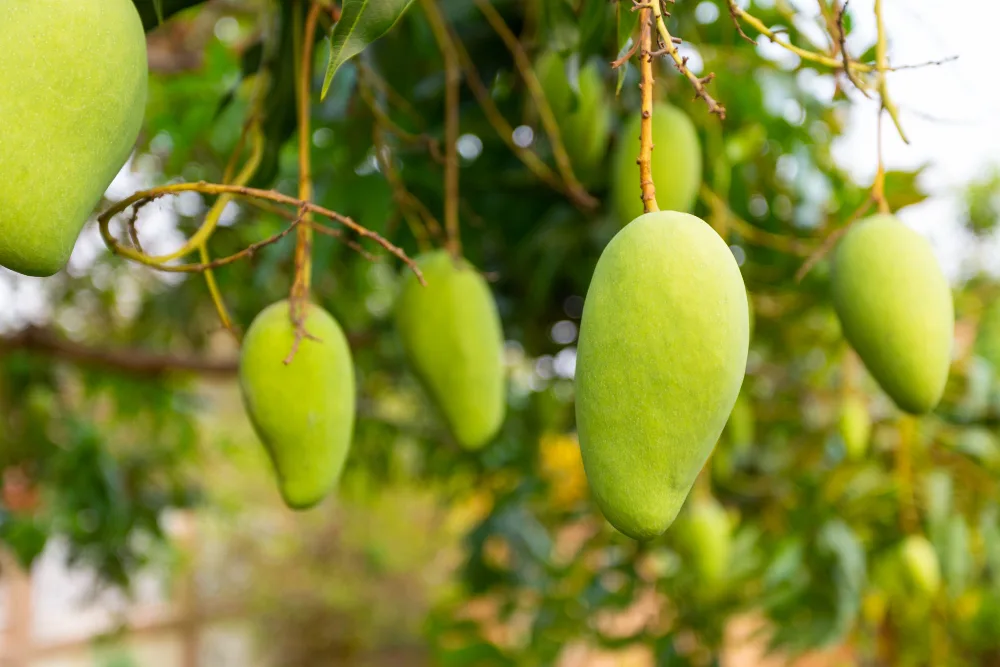Are you a fan of the juicy, tropical sweetness that only mangoes can offer? Well, get ready to indulge guilt-free because science says eating mangoes is not just a delicious treat – it’s also incredibly good for your gut health! Join us as we explore the fascinating link between enjoying this succulent fruit and promoting a happy, healthy gut.
Mangifera Indica
Mangifera Indica, commonly known as the mango tree, is a tropical fruit-bearing tree native to South Asia. This evergreen tree belongs to the Anacardiaceae family and is widely cultivated for its delicious and juicy fruits. The mango tree can grow up to 100 feet tall with a dense canopy of dark green leaves, providing ample shade in hot climates.
The mango fruit produced by Mangifera Indica is not only renowned for its sweet taste but also for its numerous health benefits. Rich in vitamins A and C, as well as dietary fiber, mangoes are excellent for promoting gut health and boosting immunity. In addition to being packed with nutrients, mangoes are also believed to have antioxidant properties that help protect cells from damage.

With over 1,000 different varieties of mangos grown worldwide, it’s no wonder why this fruit is often referred to as the “king of fruits.”
From the popular Alphonso variety in India to the Haden variety in Florida, each type offers a unique flavor profile and texture that caters to different tastes.
Next time you enjoy a juicy mango slice or blend it into a refreshing smoothie on a hot summer day, remember that you’re not just treating your taste buds – you’re also nourishing your body with essential nutrients that support overall well-being.
Research by University of Hyderabad scientists
In an exciting development, scientists from the University of Hyderabad have conducted groundbreaking research on the health benefits of mangoes. These researchers delved into the impact of consuming mangoes on gut health, shedding light on its positive effects. Through their meticulous studies and experiments, they uncovered valuable insights that highlight the significance of including mangoes in our diet.
Scientists from the University of Hyderabad, including Gangadhar, Suresh Kalangi, and Anil Kotha from Professor Reddanna’s lab, have shown that mangiferin, found in mangoes, can shield animals from experimentally induced colitis.
Read more about findings on Instagram
The findings from the University of Hyderabad’s research emphasize how incorporating mangoes into our daily meals can contribute to a healthier gut microbiome. This is crucial for maintaining overall well-being and supporting digestive functions. The scientists’ work has provided compelling evidence to support the notion that eating mangoes can be beneficial not only for our taste buds but also for our gut health.
Their innovative approach and dedication to unraveling the mysteries behind mango consumption have paved the way for a deeper understanding of this delicious fruit’s potential health advantages. By bringing attention to the connection between mango intake and gut health, these scientists have opened up new avenues for exploring dietary interventions that could enhance our overall wellness.
Eating mangoes is good for your gut health, say scientists
If you’re looking to boost your gut health, scientists suggest adding mangoes to your diet. Recent research conducted by University of Hyderabad scientists has shown that consuming mangoes can promote a healthy gut microbiome.

The natural fibers and enzymes found in mangoes help support digestion and maintain a balanced gut flora. This can lead to improved nutrient absorption and better overall digestive health.
In addition, the high levels of vitamins A and C in mangoes provide antioxidant properties that can reduce inflammation in the gut. By incorporating this delicious fruit into your meals, you may experience fewer digestive issues and feel more energized throughout the day.
So next time you’re craving a sweet treat, reach for a juicy mango knowing that not only will it satisfy your taste buds but also benefit your gut health in the process.
Other health benefits to eating mangoes
Aside from promoting gut health, eating mangoes offers a large amount of other health benefits.
Mangoes are packed with vitamins A and C, which are essential for boosting the immune system and supporting healthy skin.
They also contain antioxidants like quercetin, isoquercitrin, astragalin, and fisetin that help protect the body against various diseases.
The high fiber content in mangoes aids in digestion and can help prevent constipation.
Moreover, the potassium in mangoes can assist in regulating blood pressure levels and supporting heart health.
Mangoes have been linked to reducing inflammation in the body due to their anti-inflammatory properties.
Why is mango called as king of fruits
Mangoes have rightfully earned the title of “king of fruits” due to their exceptional taste, versatility, and numerous health benefits. With over a thousand different varieties, mangoes delight taste buds with their sweet and tangy flavor profiles that vary from creamy to zesty. The fruit’s vibrant colors and juicy flesh make it a feast for both the eyes and the palate.
In addition to being delicious, mangoes are packed with essential nutrients like Vitamin C, A, E, and dietary fiber. These nutrients help boost immunity, improve skin health, aid digestion, and promote overall well-being.
Furthermore, mangoes are known for their antioxidant properties that can help reduce inflammation in the body and protect against chronic diseases. This powerhouse fruit is not only a treat for your taste buds but also a nutritional powerhouse that reigns supreme among fruits worldwide.
Where are mangoes from?
Mangoes, often referred to as the king of fruits, have a rich history that dates back thousands of years. Originating in South Asia, specifically India and Myanmar, mango trees were first cultivated over 4,000 years ago.
As trade routes expanded, mangoes made their way to other parts of the world including Southeast Asia, Africa, and eventually the Americas. Today, countries like Mexico and Brazil are top producers of this delicious fruit.
The tropical climate in these regions provides the perfect conditions for mango trees to thrive and produce an abundance of sweet and juicy fruits. The diversity of mango varieties is vast – from the popular Alphonso variety in India to the Tommy Atkins variety commonly found in North America.
Whether enjoyed fresh on a hot summer day or blended into a refreshing smoothie, mangoes continue to be cherished around the globe for their unique flavor and nutritional benefits.
What is the best time to eat mango?
The best time to indulge in the juicy goodness of a ripe mango is during its peak season, typically from March to July. As the sun shines brighter and the temperatures rise, that’s when these tropical fruits are at their sweetest and most flavorful.
Whether you enjoy them as a refreshing snack on a hot summer day or incorporate them into your meals for an added burst of flavor, mangoes can be enjoyed throughout the day. Consider starting your morning with a slice of fresh mango alongside your breakfast or blending it into a smoothie for an energizing boost.
Also read: Mango smoothie in just 4 minutes
For those looking for a satisfying dessert option, why not try some diced mango over vanilla ice cream? The natural sweetness of the fruit pairs perfectly with the creamy texture of the ice cream.
No matter what time you choose to savor this delicious fruit, one thing is certain – eating mangoes will surely brighten up your day!
National mango day
Did you know that there is a day dedicated to celebrating the deliciousness of mangoes? National Mango Day falls on July 22nd every year, honoring this beloved tropical fruit in all its sweet and juicy glory.
On this special day, people around the world come together to taste favorite mango recipes, from refreshing smoothies and salads to decadent desserts like mango cheesecake and sorbet. It’s a time to appreciate the unique flavor and versatility of mangoes in culinary creations.
2024 – July 22, Monday
2025 – July 22, Tuesday
2026 – July 22, Wednesday
2027 – July 22, Thursday
2028- July 22, Saturday
Whether you enjoy them fresh off the tree or incorporated into savory dishes, there’s no denying the joy that mangoes bring to our taste buds. So mark your calendars for National Mango Day and join in on the festivities by savoring the goodness of this king of fruits!
Conclusion
As we’ve explored the incredible benefits of eating mangoes for gut health, it’s evident that this tropical fruit is a powerhouse of nutrition. With its rich fiber content and high levels of vitamins and antioxidants, mangoes can truly work wonders for your digestive system.

When University of Hyderabad scientists discovered the positive impact mango consumption has on gut microbiota, it shed light on just how important this fruit is for our overall well-being. Not only does it promote good digestion, but it also boosts our immunity and helps in maintaining a healthy weight.
The next time you bite into a juicy mango, remember that you’re not just enjoying a delicious treat – you’re nourishing your body from the inside out. So make sure to include this tasty fruit in your diet regularly to reap all its amazing benefits!
FAQ
Q: Can mangoes improve digestion?
A: Yes, mangoes are rich in dietary fiber and enzymes that can aid in digestion and promote gut health.
Q: Are there any side effects of eating too many mangoes?
A: While mangoes offer numerous health benefits, eating them in excess can lead to weight gain due to their high sugar content. It’s best to enjoy them in moderation as part of a balanced diet.
Q: How do I know if a mango is ripe?
A: A ripe mango will give slightly when gently squeezed and emit a sweet fragrance at the stem end. Avoid mangos with wrinkled skin or dark spots.
Q: Can people with diabetes eat mangoes?
A: People with diabetes should monitor their intake of fruits like mangoes due to their natural sugars. Consult with a healthcare provider for personalized advice on including mangos in your diet.
Adding delicious and nutritious mangoes into your diet can have great benefits for your gut health and overall well-being. So next time you’re craving a sweet treat, reach for this juicy fruit – your stomach will thank you!
You may also like to hear:
Top 10 health benefits of coconut water
